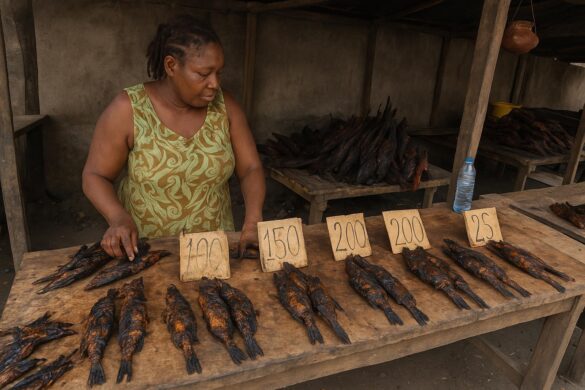Government Announces Temporary Suspension of Customs Duties
On Sunday, the Congolese Ministry of Economy and Finance issued a notice announcing the temporary removal of customs duties, data processing fees, and value-added tax on a selection of essential food products and agricultural inputs.
This measure, described as exceptional and limited to twelve months, is part of the broader “resilience plan” adopted last year to contain the rising cost of living and maintain the purchasing power of urban and rural households.
Targeted Essential Food Products and Agricultural Inputs
According to the circular, this concession covers wheat, polished rice, refined vegetable oil, powdered milk, frozen sea fish, salted fish, as well as refrigerated or frozen domestic meats and offal. Fertilizers, certified seeds, and compound animal feed are also included.
Officials state that exempting these categories addresses both demand, by reducing store prices, and supply, by lowering production costs for breeders and growers who rely on imported inputs to maintain their yields.
Dependence on Imports Influences Policy Choices
Government data places the country’s annual food import bill between 500 and 700 billion CFA francs. Despite an estimated arable land area of ten to twelve million hectares, local production remains below population growth and evolving food preferences.
Economic analysts note that every percentage point reduction in customs costs can translate into significant savings for public finances, as the Treasury currently supports price stabilization mechanisms for flour, fuel, and transport.
Price Stabilization Outlook
Traders anticipate a four to six-week delay before the first duty-free shipments leave the Pointe-Noire docks and enter wholesale depots.
Nevertheless, many households view this decree as a sign of the government’s attention.
Implementation and Monitoring Schedule
The Director-General of Customs has been tasked with translating the ministerial guidelines into operational instructions at ports, airports, and inland checkpoints. An internal memo sets April 1st as the effective start date.
A joint monitoring unit involving the Ministries of Economy, Trade, and Agriculture will compile monthly dashboards on import volumes and retail price trends. The results will inform any mid-course adjustments or possible extensions beyond the initial horizon.
Regional Context and Inflationary Pressures
Across Central Africa, consumer inflation accelerated after the outbreak of hostilities in Ukraine disrupted grain and fertilizer flows. CFA zone countries, including Congo-Brazzaville, depend on maritime wheat shipped via Atlantic corridors and processed locally.
The Bank of Central African States recently projected average inflation above the CEMAC convergence threshold this year, citing food and transport as the main drivers. Congo’s tariff suspension is expected to moderate, though not fully offset, these pressures.
Untapped Agricultural Potential
Agronomists often highlight the departments of Kouilou, Niari, and
